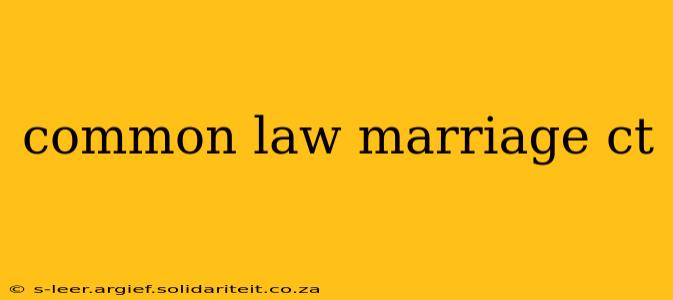Connecticut, like many states, once recognized common-law marriages, also known as informal marriages. However, Connecticut no longer recognizes common-law marriages formed after January 1, 1995. This means that couples who cohabitate and represent themselves as married after that date will not be legally considered married in the eyes of the state, regardless of their intent or duration of cohabitation. Understanding the implications of this legal change is crucial for couples in Connecticut. This guide will explore the nuances of common-law marriage in Connecticut, focusing on the past, the present, and the potential consequences of believing a common-law marriage exists.
What is a Common-Law Marriage?
A common-law marriage, also referred to as an informal marriage, is a marriage created without a formal marriage ceremony or license. Historically, it was recognized in several states, including Connecticut, based on the couple's intent to be married and their presentation of themselves as a married couple to others. Key elements typically included cohabitation, a clear expression of intent to be married, and public acknowledgment of the marital relationship. However, the legal landscape has significantly changed, particularly in Connecticut.
Does Connecticut Recognize Common-Law Marriages Formed After January 1, 1995?
No. Connecticut repealed its recognition of common-law marriages formed after January 1, 1995. This means that any couple who began living together and presenting themselves as married after this date will not be considered legally married in Connecticut, regardless of how long they have lived together or how strongly they believe they are married. This is a critical distinction and a frequent source of legal complications.
What if a Couple Believed They Were in a Common-Law Marriage?
If a couple believed they were in a common-law marriage, even if formed after January 1, 1995, they are not legally married under Connecticut law. This can have significant implications for:
-
Property rights: In the absence of a legal marriage, property division upon separation or death will follow different rules than those applicable to legally married couples. The distribution of assets will likely be determined based on property ownership laws rather than marital property division.
-
Inheritance: Heirs will inherit according to intestacy laws (laws governing inheritance when there's no will) rather than receiving spousal inheritance rights.
-
Health insurance and benefits: Spousal benefits and health insurance coverage will not be automatically afforded.
-
Tax implications: The couple will not receive the same tax benefits as married couples. Filing jointly may be impossible.
-
Child custody and support: While legal marriage doesn't automatically grant custody rights, it does influence the legal processes involved. The absence of a legal marriage could impact these proceedings.
What About Common-Law Marriages Formed Before January 1, 1995?
Connecticut continues to recognize common-law marriages formed before January 1, 1995, provided they meet the criteria established prior to the law change. However, proving the existence of such a marriage can be challenging and may require substantial evidence of the intent and public presentation of marriage. This often involves presenting documentation, witness testimony, and other compelling evidence.
How Can I Ensure My Marriage is Legally Recognized in Connecticut?
To ensure your marriage is legally recognized in Connecticut, a formal marriage license must be obtained and a marriage ceremony performed by an authorized officiant. This is the only way to guarantee legal marital status and the associated rights and protections under Connecticut law.
What are the legal ramifications of cohabitation in Connecticut?
Cohabitation in Connecticut does not automatically grant any legal rights or protections equivalent to those of marriage. While some couples might have agreements in place, in the absence of a legal marriage or a comprehensive cohabitation agreement, rights regarding property, finances, and other aspects will generally be governed by individual ownership and contract law. Legal counsel is strongly recommended for couples considering cohabitation to explore their options and potentially establish a cohabitation agreement.
This information is for educational purposes only and does not constitute legal advice. Consult with a qualified Connecticut attorney for advice tailored to your specific circumstances. Navigating the complexities of marriage and cohabitation requires professional legal guidance.
